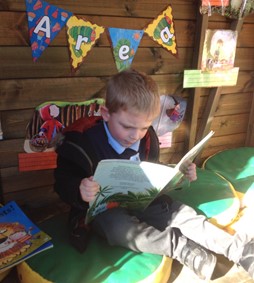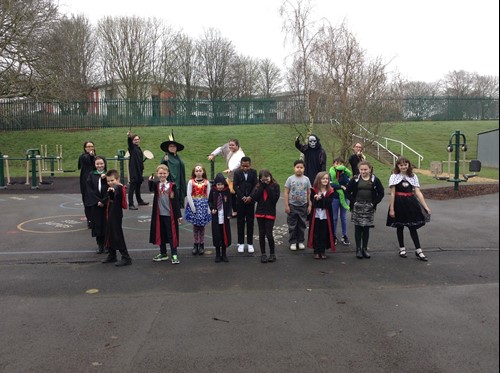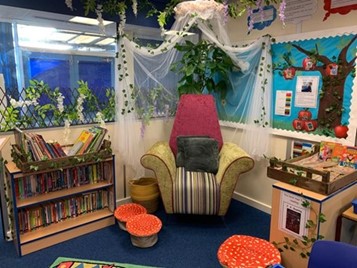Reading
At William Reynolds Primary school, we aim to instill a love of reading in all our pupils. Our curriculum is designed to ensure that pupils not only read for pleasure but use books to research and gather new knowledge to extend their understanding.
Our principle aims - from the National Curriculum in England - for Reading are to:
- put reading at the heart of the curriculum.
- inspire pupils to develop a ‘lifelong love of reading’
- ensure that pupils develop fluency to confidently read at speed (90 words per minute).
- provide pupils with the ability to understand what they have read and use that information for a given purpose.
We know that reading is the passport to the world and ability to communicate effectively. Reading enables children to acquire a richer vocabulary and develop an understanding of their world.

The core of our reading curriculum is the National Curriculum for England which is supported by Read, Write Inc, Rapid Readers and Reading Gems. A variety of approaches to support delivery of the reading curriculum across the school were researched by our subject leader. Read, Write Inc is a systematic, synthetic phonics scheme that is validated by the Department For Education to ensure that children are able to learn the phonics code required for them to become fluent, confident readers. The curriculum has been specifically sequenced in a logical progression (supported by Reading Gems) to ensure that new knowledge and skills build on what has been taught before: Early Years to Year 6. This enables our pupils to know more and remember more. End points and target points within objectives are identified for each year group through a whole school reading progression plan.
All pupils are exposed daily to a variety of quality books and shorter texts that are both fiction and non-fiction. Everybody can become fluent, confident readers who are able to successfully comprehend and understand a wide range of texts. Pupils develop a love of reading; a good knowledge of a range of authors; understand more about the world in which they live to widen their horizons and raise their aspirations. Reading is prioritised across our broad and balanced curriculum allowing pupils to read and understand all subjects. Pupils develop resilience by reading and re-reading to develop their understanding of challenging vocabulary.
As a result of the pandemic, our curriculum has not been narrowed however, Rapid Readers intervention has been accessed by pupils who need additional support to close any gaps in their learning.
We place reading at the heart of the curriculum, so it is prioritised allowing pupils to access the full curriculum offer. Around school, you will find displays which celebrate authors - including our author of the term displays - inspiring reading areas, pupil’s favourite books, authors and recommended reads. Daily story time takes place in every class with an adult modelling fluency and intonation. It is supported with a whole school reading spine which introduces them to a range of stories written by highly regarded authors.
At all stages, reading attainment is assessed to ensure that gaps are addressed quickly and effectively so that pupils’ progress is accelerated. Early readers are taught by skilled teaching staff through the Read, Write Inc programme, ensuring that their reading books match their current phonetic understanding. Continuous assessment takes places to ensure that pupils have embedded new knowledge and understanding to inform the teaching sequence and groupings or the need for tutoring. There is a sharp focus on ensuring pupils gain fluency and phonic knowledge alongside language comprehension as modelled by the Scarborough Reading Rope (2001).
Daily Guided Reading takes place, to ensure that pupils can become fluent, confident readers and are questioned about their understanding of the texts within group discussions. In Year Two and Three, there is a small group teacher focus daily, which develops understanding of vocabulary and comprehension. Other activities include reading for pleasure through a choice of topic books (to encourage cross curricular reading) or access to Bug Club. In Years 4, 5 and 6, specific comprehension skills are taught through a whole class guided read with domain questions supported by Reading Gems within a whole school progression model. Formative assessment takes place daily, while termly summative assessment takes place in the form of NFER testing which allows analysis of gaps in learning to be quickly addressed.
Those pupils who require additional support with decoding or comprehension are targeted with Rapid Readers intervention groups, or Read, Write inc. Parents are made aware of this, as well as the book band stage their children should be able to access at their age. Bookmarks featuring age-appropriate book bands are issued to all pupils, and their progress and attainment (below, at or above national expectations) is marked as they improve during the school year.

Our pupils are competent readers who are able to access a range of appropriate texts in order to discover and research as well as enjoy a poem or story. They are able to talk about the books that they and their teachers read, and which authors they like and why. Overwhelmingly, children make good or better progress and achieve well.
The impact of our curriculum is that:
- Pupils of all abilities succeed in all reading lessons because they read widely and often.
- Pupils use phonetic code to decode and blend words.
- Fluent readers can then access all curriculum areas.
- Pupils have developed a personal awareness, preferences and opinions on a range of authors, genres & texts.
- Pupils are prepared to read in any subject in their next stage of education.
- Parents and carers have a good understanding of how they can support reading and home and contribute regularly to home-school records.
We firmly believe that reading is the key to all learning, and so the impact of our reading curriculum goes beyond the results of the statutory assessments. It influences not only reading skills, but also the wider curriculum and the understanding of our world. Our pupils know more; they remember more therefore they can do more!



